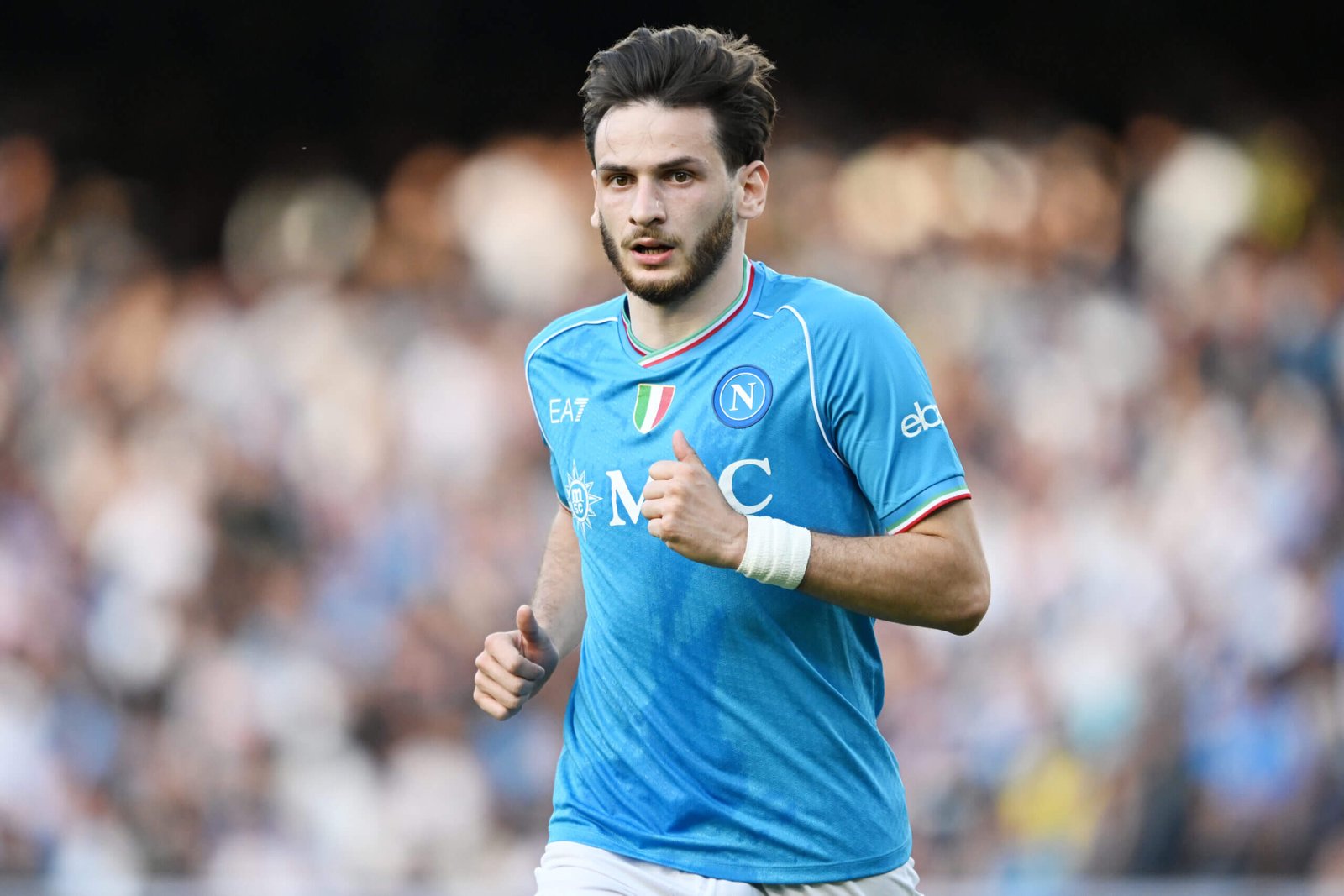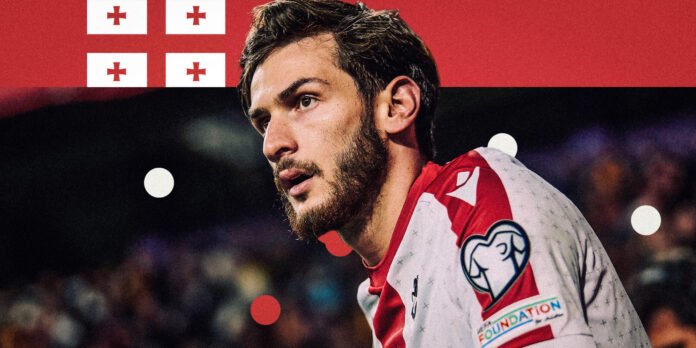Napoli star Khvicha Kvaratskhelia is likely to get the attention this summer, for good reason. At the back, Valencia’s goalkeeper Giorgi Mamardashvili is another strength who is attracting attention in the transfer market. The defence in front of him is a weakness, but Georgia have enough talent to cause some trouble in a mediocre group…
How to follow Euro 2024 on The Athletic…
The manager
If you lead a national team to their first major tournament, it is a fair bet that you will be adored.
Former France full-back Willy Sagnol took over Georgia at a difficult time four years ago, when they had narrowly failed to qualify for Euro 2020 after losing to North Macedonia in their Path D play-off final. The game was delayed and played without fans because of Covid-19 restrictions, leaving Georgia without their vociferous home support.
After coach Vladimir Weiss resigned, Sagnol’s main task was to rebuild the team psychologically — the core of a talented group was already developing, headlined by Napoli star Kvaratskhelia.
They reached the play-offs again and, after overcoming Luxembourg 2-0 and beating Greece on penalties, finally had their qualification.
“It’s my greatest achievement as a manager,” he told The Athletic after qualification. “Three years ago, when I decided to take the job, lots of people — even in my close environment — asked: ‘Why are you going there?’ But now I can say, ‘Look, we worked hard and we have achieved something’. I’m very glad and happy about it.”
Georgia play a form of 5-3-2, which gives their dangerous wing-backs room to roam, as well as freeing up Kvaratskhelia, who almost plays a free role as a second striker.
Sagnol’s players love him — to the extent that he has even helped several of them with transfers, such as alerting Bordeaux to the talents of 23-year-old forward Zuriko Davitashvili.
Georgia’s French coach Willy Sagnol (Cesar Manso/AFP/Getty Images)
The household name in waiting
At 23, Kvaratskhelia is already the most famous Georgian player in history. He is a hero in Naples. The city bequeathed him a new nickname, ‘Kvaradona’, borrowed from their greatest footballing son, as he delivered Napoli’s first league title in 33 years in 2023. Police even arrested a fugitive from Georgia who risked capture to see his hero play in person.
Despite winning Serie A’s Most Valuable Player award and the league title, most fans outside of Italy and Georgia will not have seen him regularly. His superpower is dribbling — he is an ambidextrous stylist whose upright posture and incredible close control enable him to move late, either way, at speed.
He cuts in from the left for Napoli but, given Georgia’s wing-back system, Sagnol uses him differently.
“The last two years we worked on playing him more centrally when we have the ball because he can score a lot of goals and provide a lot of assists,” he says. “It was key to have this kind of player in the most important part of the pitch because I don’t have a lot of players like him.”
Keep an eye out for strike partner Giorgi Mikautadze, signed by Ajax last summer, who has elements of Neal Maupay’s build and aggression — though his finishing has been clinical since returning to Metz on loan.

Napoli’s Khvicha Kvaratskhelia (Francesco Pecoraro/Getty Images)
Strengths
Outside of Kvaratskhelia, Georgia’s biggest strength is in the net. In the shape of 6ft 6in (198cm) Giorgi Mamardashvili, they have one of Euro 2024’s better goalkeepers. It was his penalty save from Greece’s Anastasios Bakasetas — and not a goal from the Napoli attacker — that sent Georgia to Germany.
After starring for Locomotive Tbilisi, Mamardashvili joined Valencia in January 2022 and instantly established himself as their No 1. He is still just 23. During those two and a half seasons, he has established himself as one of La Liga’s top shot-stoppers — he ranked first for ‘goals prevented’ last season — while his distribution is also varied and accurate. Interest has been shown by Chelsea, Newcastle United, and Atletico Madrid.
Georgia will probably face a lot of shots and, in Mamardashvili, the final line of their defence is as prepared as it can be.
Weaknesses
Are Georgia’s centre-backs up to the task? They kept two crucial clean sheets against Luxembourg and Greece, but are untested at Europe’s top level.
Captain Guram Kashia is now 36, and the most experienced of the trio, having played for Vitesse for eight years and spent two years in MLS with San Jose Earthquakes. He is Georgia’s most-capped player of all time.
Kashia is also a real leader — he has been outspoken about his support for gay rights in conservative Georgia, winning a UEFA award for his advocacy, and has eloquently discussed the country’s relationship with Russia.
Kashia’s lack of mobility means he will play in the centre of the three and will be flanked by APOEL Nicosia’s Lasha Dvali and Al Okhdood’s Saba Kvirkvelia. Both are large men who are good in a low block, but their on-ball ability is limited. Georgia could struggle if the match opens up.

Georgia’s defender Guram Kashia (Giorgi Arjevanidze/AFP/Getty Images)
Thing you didn’t know
Football is not the biggest sport in Georgia. The national sport is rugby union, where the ‘Lelos’ (men’s national team) have reached every World Cup since 2003, taking some impressive scalps along the way.
Politics can partially explain its popularity. Georgia was under the rule of the Soviet Union between 1921 and 1991 — and during that time, leadership in Moscow decried rugby as a bourgeois game, and instead pushed football onto the population.
The fearsome Lavrentiy Beria — one of Joseph Stalin’s right-hand men, and the chief of the secret police (NKVD) — was Georgian-born, and decided he would keep NKVD employees fit using football. That led to the formation of Georgia’s most famous team, Dinamo Tbilisi, a squad made up of policemen notorious for their use of torture.
As the team developed, Beria and his underlings began to recruit the sons of those they had executed — and a shadow formed over the sport in Georgia.
After the country regained its independence, rugby became a way to reestablish national pride — only now, 33 years later, is football beginning to reassert itself.
Expectations back home
Perhaps more than any team, Georgia are thrilled to be in the competition. Their support across sports is sizeable and raucous. They are in a group with several experienced European sides, but after qualifying through the play-offs, are used to playing matches with pride at stake.
Their first two games are the more winnable, with Portugal lurking at the end. Though they will be underdogs against Turkey and the Czech Republic, Turkey’s relative openness means they are a decent match-up stylistically. Against the Czech Republic, neither side will particularly want the ball, with both working better in transition.
Georgia’s squad
Goalkeepers: Giorgi Loria (Dinamo Tbilisi), Giorgi Mamardashvili (Valencia), Luka Gugeshashvili (Qarabag).
Defenders: Guram Kashia (Slovan Bratislava), Otar Kakabadze (Cracovia), Solomon Kvirkvelia (Al Okhdood), Lasha Dvali (APOEL), Jemal Tabidze (Panetolikos), Luka Lochoshvili (Cremonese), Giorgi Gocholeishvili (Shakhtar Donetsk), Giorgi Gvelesiani (Persepolis).
Midfielders: Gabriel Sigua (Basel), Nika Kvekveskiri (Lech Poznan), Otar Kiteishvili (Sturm Graz), Saba Lobzhanidze (Atlanta United), Zuriko Davitashvili (Bordeaux), Giorgi Chakvetadze (Watford), Levan Shengelia (Panetolikos), Giorgi Tsitaishvili (Dinamo Batumi), Anzor Mekvabishvili (Universitatea Craiova), Giorgi Kochorashvili (Levante), Sandro Altunashvili (Wolfsberger)
Forwards: Giorgi Kvilitaia (APOEL), Khvicha Kvaratskhelia (Napoli), Budu Zivzivadze (Karlsruher), Georges Mikautadze (Metz).
(Top image via Getty Images; designed by Eamonn Dalton)
Read the full article here


